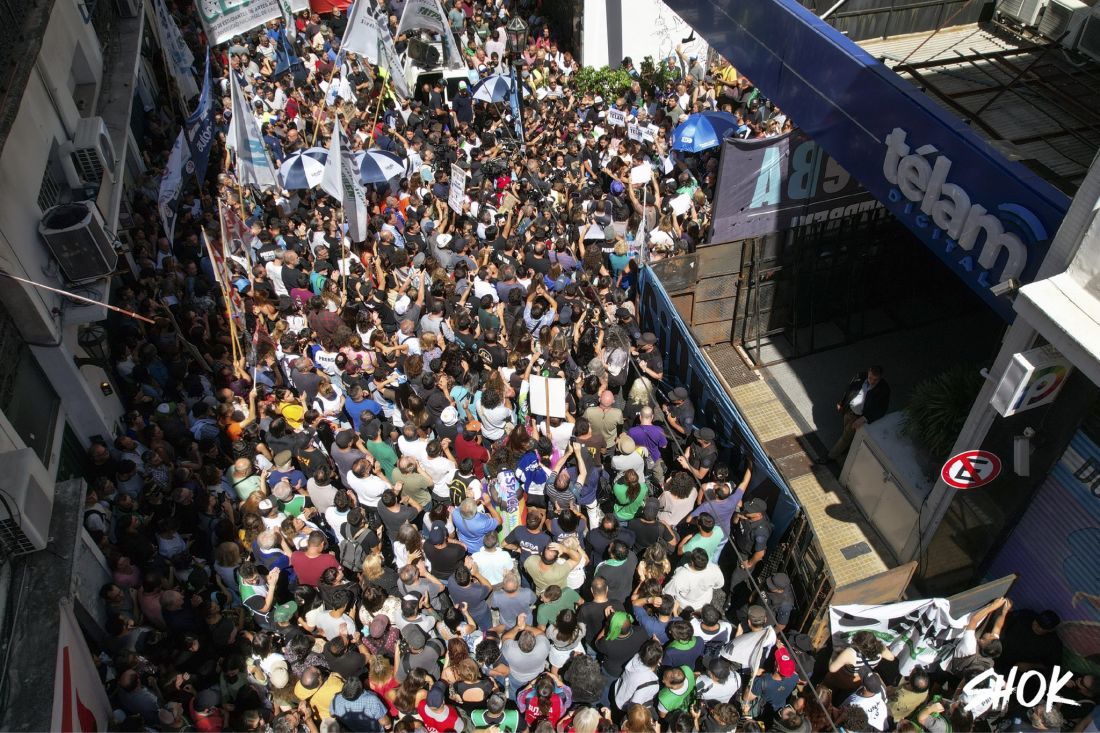Argentina : the worrying decline of press freedom

On March 1st, the president of Argentina, Javier Milei, announced the closure of Télam, the country’s largest press agency, in his opening speech of the ordinary sessions of Congress. This announcement raises concerns over press freedom in the country, as the president’s attacks against the press intensify.
“This is a very serious attack on freedom of the press, an attack on freedom of expression, the likes of which has not been seen for decades in Argentina, of a magnitude that we are still unable to quantify.” For Tomás Eliaschev, a journalist and union representative of the Syndicate of the Press of Buenos Aires (SiPreBa), the decision to suspend Télam’s activities is the first of many steps that will limit press freedom in Argentina.
On Monday, March 4th, all employees of Télam received an email stating that all services were suspended for a week, which has been extended for an additional week. Since then, access to the work spaces has been made impossible, and both the online portal and networks were left inactive. To make themselves heard, the journalists have been sitting in front of the two main agencies of Télam in Buenos Aires.
This suspension intervenes in a context of high press hostility coming from the executive part of the government as the president Javier Milei threatened to privatise or close entirely public press agencies. In previous declarations, the president accused Télam and public press agencies at large to be “a mechanism of propaganda” and coined them as “ñoquis” (Argentinian slang word referring to employees getting paid a guaranteed salary but doing very little work). Nevertheless, the decision to close Télam cannot be made unilaterally by the government and must be approved by the Congress where Javier Milei’s party, The Libertarian Party, does not have a majority.
“We believe that these actions have as an objective to try to break the workers.”
But this announcement and the suspension of Télam could have another purpose according to the director of the Latin America and the Caribbean office of the International Federation of Journalists (IFJ), Paula Cejas: “Legally they cannot unilaterally close the agency. We believe that these actions have as an objective to try to break the workers and undermine the prestige of the agency in order to make privatisation more attractive to public opinion.”
The suspension of Télam could also have a higher impact than the disappearance of an ordinary press agency, as Télam is the largest one in Argentina and is the relay of Argentinian news for many national and international private media outlets. The disappearance of public media in Argentina would severely endanger press freedom, as they play an extremely important part in the country’s information landscape.
Indeed, public media are the only ones present all around the country and therefore, are the main producers of local news, which the private media often lack. “Without public media, villages and provinces outside the capital and major cities will be under-represented in the media. Without local news, press freedom, plurality of voices and democratic communication will degrade,” explains Paula Cejas. Télam radio audiovisual service, portal and networks are also means through which journalists and press workers from all over the country get to organize information. If these means are definitively suspended, small and regional media may encounter more difficulties than before in relaying local information and therefore in continuing to exist.
An echo on the growing threats to press freedom
The decision to suspend Télam is one of many attacks on press freedom in Argentina. “It is part of an escalation of repression, persecution, and attacks on freedom of expression of this government which, in the words of Javier Milei himself, permanently attacks magazines, affecting them with measures making their work more difficult,” declares Agustín Lecchi, journalist and general secretary of the Syndicate of Buenos Aires press (SiPreBa).
The first legal attack on the press happened in December of 2023 when president Javier Milei presented the Omnibus bill. This bill is destined to massively reform Argentina’s economy, tax system and electoral law. Part of it takes aim at the press and would enact the elimination of public advertising seen by the government as a form of bribery. A decision that, according to Agustín Lecchi, “does not affect the big media, but above all the small local media in different regions of the country.”
“Journalism in Latin America has high rates of precariousness.”
The elimination of public advertising will also put journalists in an even more precarious state, which has already been made difficult by the flexibilization of labour laws in Argentina. “Journalism in Latin America has high rates of precariousness, and the few workers who have rights are on the verge of losing them. A few days ago, one of the largest news channels suspended more than 200 workers for being members of the television union, which is on strike for better wages. There is an official rhetoric that is allowing this to happen, even before the flexibilization laws were passed,” explains Paula Cejas.
Outside of economic sanctions, journalistic work and coverage of social events, especially political ones, are also made difficult by the government. For example, according to Tomás Eliaschev, minister of security Patricia Bullrich (Republican Proposal) has put in place a repressive protocol against social protests, which has a stipulation dedicated to restricting the work of the press. “They state that journalists should not be present when there are demonstrations and that police repression should not be filmed. They want us not to reflect on the police actions, which many times are completely against the current regulations.”
“They received pellets, bullets, rubber bullets and drums.”
The police have already targeted journalists, and especially during the demonstrations against the Omnibus bill. According to Tomás Eliaschev, more than 30 journalists, cameramen and reporters have been attacked and injured by the police: “They received pellets, bullets, rubber bullets and drums. They have been sprayed with pepper spray, which has a long-lasting effect on the body. These weapons cannot be considered as deterrent weapons but are intended to severely injure.”
Moreover, according to the IFJ, the government has taken a further step by proposing to dissolve the Defensoría del Público, an institution set up to monitor good media practices.
This proposition could greatly impact not only press freedom but the accuracy of the information being published and would leave private actors free of publishing news infringing on deontological and democratic practices.
This article was written by MA2 students from ULB and VUB under the coordination of Milan Augustijns, Alexandre Niyungeko and Lailuma Sadid.

